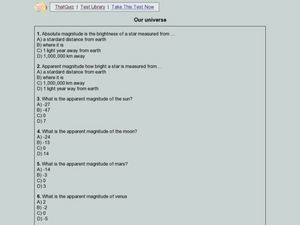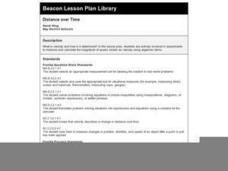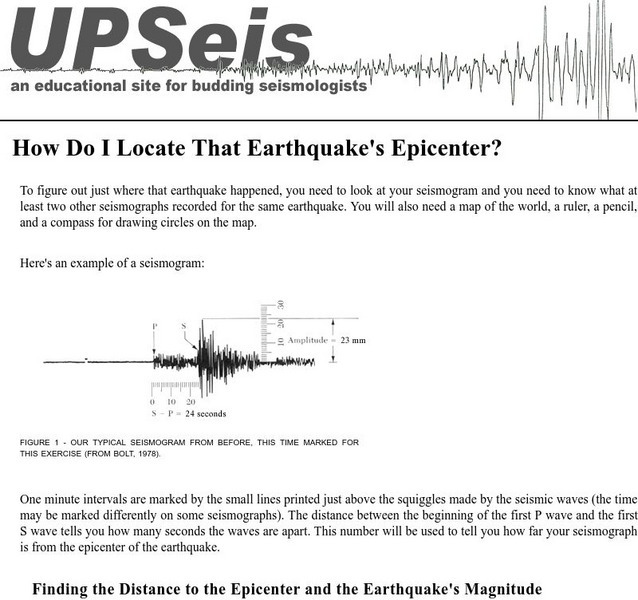Curated OER
Magnitude of Earthquakes
Students investigate the causes and effects of earthquakes and investigate their magnitude. In this earthquakes lesson, students study the Richter Scale and measure it as it relates to the energy released by an earthquake. Students work...
Curated OER
Our universe
For this quiz, students are asked 20 questions about the magnitude of planets and stars both in and out of our Solar System. An answer key is provided.
Curated OER
Plotting Earthquakes
In this earthquakes worksheet, students access a website to gather information about the magnitude and location of earthquakes for 5 days. Then students complete 7 short answer questions.
Curated OER
Mechanics
For this mechanics worksheet, students determine the magnitude of the velocity of a given object, the initial speed of this object, plus find the maximum acceleration and the period of oscillation of the system given. This worksheet has...
Curated OER
Earthquakes & Volcanoes
In this earthquake and volcano worksheet, students use the Internet site given to complete each of the questions. They identify and describe various major earthquakes that have occurred in the US. Then they describe where molten rock...
Curated OER
Multivariable Calculus: Dot Product
In this dot product worksheet, students identify the properties of the dot product. They sketch vectors and obtain expressions for diagonals. This two-page worksheet contains examples and explanations with two problems.
Curated OER
Magnitude of the Richter Scale
Students examine how a Richter scale operates. They create a booklet illustrating each rating on the scale. They discover how engineers use different measurement tools.
Curated OER
Distance over Time
Students analyze velocity and how it is determined. They experiment with velocity in order to measure and calculate the magnitude of speed. They use examples in their novel "Skateboard Renegade" to relate velocity to real life situations.
Curated OER
Newton's Law of Universal Gravitation
Pupils explore the nature and magnitude of gravitational forces. In this gravitation lesson plan students study gravity and answer questions.
Curated OER
Constellation Study Guide
In this constellation worksheet, learners choose a constellation to sketch and to determine the basic characteristics of that constellation including the magnitude and color of its brightest star. This worksheet has 1 drawing, 1 short...
Curated OER
Destruction by Earthquakes
In this earthquakes learning exercise, students review terms associated with earthquakes such as Richter scale, seismographs, and the Moho scale. This learning exercise has 10 fill in the blank questions.
Curated OER
A Whole Lot of Shakin' Goin' On!
Students gather data about the 1906 and 1989 earthquakes, make comparisons between the two, and determine the factors that influence the amount of shaking that occurs in an area due to an earthquake. They identify that the distance is...
Curated OER
Vectors
Learners use both magnitude and direction to locate a place. They use locating techniques to make a temperature field of their classroom.
Science Education Resource Center at Carleton College
Serc: Orienteering With Vectors
An activity where students use their knowledge of vectors to create orienteering directions for their fellow classmates to follow. The directions must contain at least 6 checkpoints and the final checkpoint includes a prize!
American Association of Physics Teachers
Com Padre Digital Library: Open Source Physics: Vector Components Model
An interactive java applet model allows students to explore vectors. Students can practice finding the direction and magnitude of a vector given its x and y-components as well as practice finding the x and y-components given a vector's...
American Association of Physics Teachers
Com Padre Digital Library: Open Source Physics: Vector Addition Model
This Java applet simulation explores vector addition of two vectors in two dimensions. Given the magnitude and direction, students must determine the vector components.
University of Colorado
University of Colorado: Ph Et Interactive Simulations: Vector Addition
Learn how to add vectors. Drag vectors onto a graph, change their length and angle, and sum them together. The magnitude, angle, and components of each vector can be displayed in several formats.
University of Colorado
University of Colorado: Ph Et Interactive Simulations: Vector Addition
Learn how to add vectors. Drag vectors onto a graph, change their length and angle, and sum them together. The magnitude, angle, and components of each vector can be displayed in several formats.
Other
Stat Soft: Getting Started With Statistics Concepts
Definitions of the basic concepts in statistics. Great for review and discussion or for introduction into topics.
TeachEngineering
Teach Engineering: I Can't Take the Pressure!
Students develop an understanding of air pressure by using candy or cookie wafers to model how it changes with altitude, by comparing its magnitude to gravitational force per unit area, and by observing its magnitude with an aluminum can...
Michigan Technological University
Michigan Tech: Locating an Earthquake's Epicenter
Gives directions on how to find the epicenter of an earthquake, the distance to the epicenter and the magnitude of the earthquake.
US Geological Survey
U.s. Geological Survey: Earthquakes
This resource provides information about earthquakes, including how they are measured.
Concord Consortium
Concord Consortium: Seismic Explorer
Explore the pattern of earthquakes on Earth, including magnitude, depth, location, and frequency.
Cuemath
Cuemath: Vectors
Explore the world of vectors, by finding answers to questions like what are vectors, what are scalars, what is the difference between scalar and vectors, the magnitude of a vector, operations on vectors, and properties of a vector.
























